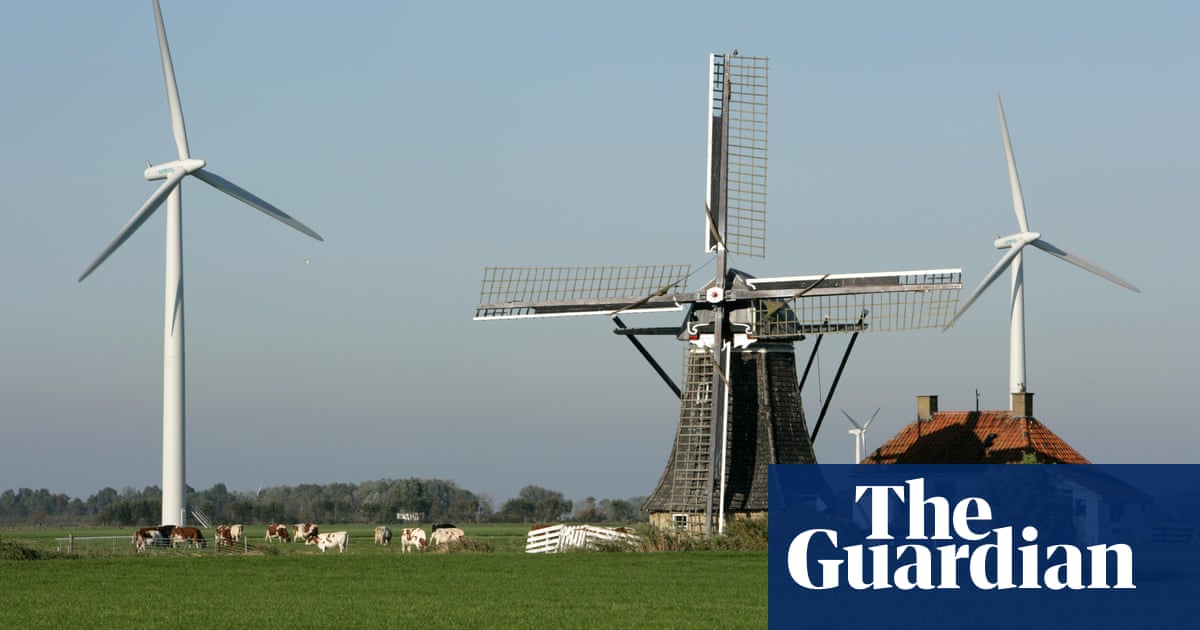
The European Union pumped out 8% less carbon dioxide from the fossil fuels it burned in 2023 than it did in 2022, the Guardian can reveal, pushing these emissions down to their lowest level in 60 years.
The fall in planet-heating pollution is the steepest yearly drop on record behind 2020, when governments shuttered factories and grounded flights to stop the spread of Covid-19, according to analysis from the Centre for Research on Energy and Clean Air (Crea).
“EU CO2 emissions have finally fallen back to levels apparent in my parents’ generation in the 1960s,” said Isaac Levi, an analyst at Crea. “Yet, over this time period, the economy has tripled – showing that climate change can be combated without foregoing economic growth.”
More than half of the drop in emissions came from the use of cleaner electricity, the report found. The EU built record levels of solar panels and wind turbines in 2023, according to industry data, and was able to make more electricity from dams and nuclear power plants that had been struck by drought and repair work the year before.
The report found that lower demand for electricity, aided by good weather, contributed to 8% of the fall in fossil CO2 emissions. Cuts in sectors such as industry – where high gas prices have led some firms to become more efficient and others to make fewer goods – and transport made up the remaining 36%.
The figures do not include sectors such as agriculture, dirty chemical processes such as cement-making, or other greenhouse gases such as methane. Analysts say emissions overall are still falling too slowly.
“The 8% reduction in emissions should be celebrated,” said Levi, “but more must be done to wean the EU off fossil fuels, reduce reliance on petrostates such as Russia, whilst also leaving the world a better place for the next generation.”
The EU bears some of the greatest responsibility for having heated the planet and made extreme weather more violent. To keep temperatures under control, it has promised to cut its greenhouse gas pollution by 55% by the end of the decade from 1990 levels before reaching net-zero emissions by 2050.
Last week, the EU’s own climate advisers said “the pace of reductions needs to increase considerably” if the bloc was to achieve its 2030 target. The 27 member states need to cut emissions about twice as fast as they have done on average over the last 17 years, according to a report from the European Scientific Advisory Board on Climate Change.
The group laid out a list of 13 recommendations that include urgently phasing out fossil fuel subsidies, expanding the European emissions pricing scheme to include agriculture, and passing the final laws in the European green deal.
“The EU has made great progress in recent years to strengthen its climate policy framework,” said Prof Ottmar Edenhofer, the chair of the advisory board, when the report was published. “But reaching climate neutrality by 2050 is a race against the clock and we cannot afford to lean back now.”
Sarah Brown, from the clean energy thinktank Ember, which was not involved in the analysis, said: “This substantial fall in emissions, particularly from the power sector, shows that the EU is accelerating its shift away from risky and expensive fossil fuels. But with the expected increase in electricity demand due to wider electrification over the coming years, renewables deployment and energy efficiency must keep pace.”
"low" - Google News
January 25, 2024 at 12:28AM
https://ift.tt/Gamc4xk
EU fossil fuel CO2 emissions hit 60-year low - The Guardian
"low" - Google News
https://ift.tt/O92W7i0
Bagikan Berita Ini














0 Response to "EU fossil fuel CO2 emissions hit 60-year low - The Guardian"
Post a Comment